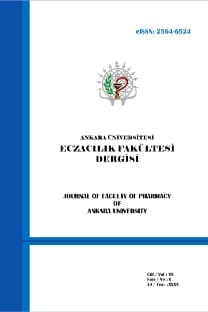ECZACILIK ÖĞRENCİLERİNİN İNTERNET ÖZ-YETERLİKLERİ
INTERNET SELF-EFFICACY OF PHARMACY STUDENTS
___
- 1. Jokisch, M. R., Schmidt, L. I., Doh, M., Marquard, M., Wahl, H. W. (2020). The role of internet self-efficacy, innovativeness and technology avoidance in breadth of internet use: Comparing older technology experts and non-experts. Computers in Human Behavior, 106408
- 2. Zhang, Y., Qin, X., Ren, P. (2018). Adolescents' academic engagement mediates the association between Internet addiction and academic achievement: The moderating effect of classroom achievement norm. Computers in Human Behavior, 89, 299-307.
- 3. Zheng, F., Khan, N. A., Hussain, S. (2020). The COVID 19 pandemic and digital higher education: exploring the impact of proactive personality on social capital through internet self efficacy and online interaction quality. Children and Youth Services Review, 105694.
- 4. Saade, R., Kira, D. (2009). Computer anxiety in e-learning: the effect of computer self-efficacy. Journal of Information Technology Education, 8(1), 177–191.
- 5. Hsiao, B., Zhu, Y. Q., Chen, L. Y. (2017). Untangling the relationship between Internet anxiety and Internet identification in students: the role of Internet self-efficacy. Information Research, 22(2), paper 753.
- 6. Bandura, A. (1997). Self-efficacy; The exercise of control. New York: Freeman.
- 7. Aşkar, P., Umay, A. (2001). İlköğretim matematik öğretmenliği öğrencilerinin bilgisayarla ilgili öz-yeterlik algısı. Hacettepe Üniversitesi Eğitim Fakültesi Dergisi, 21(21), 1-8.
- 8. Tsai, M. J., Tsai, C.C. (2003). Information searching strategies in web-based science learning: the role of Internet self-efficacy. Innovations in Education and Teaching International, 40(1), 43–50.
- 9. Alivernini, F., Lucidi, F. (2011). Relationship between social context, self-efficacy, motivation, academic achievement, and intention to drop out of high school: A longitudinal study. The Journal of Educational Research, 104(4), 241-252.
- 10. Yavuzalp, N., Bahcivan, E. (2020). The online learning self-efficacy scale: ıts adaptation into turkish and ınterpretation according to various variables. Turkish Online Journal of Distance Education, 21(1), 31-44.
- 11. Ekizoglu, N., Ozcinar, Z. (2010). The relationship between the teacher candidates’ computer and internet based anxiety and perceived self-efficacy. Procedia-Social and Behavioral Sciences, 2(2), 5881-5890.
- 12. Shcherbakova, N., Shepherd, M. (2014). Community pharmacists, Internet and social media: an empirical investigation. Research in Social and Administrative Pharmacy, 10(6), e75-e85.
- 13. Anderson, J. G. (2007). Social, ethical and legal barriers to e-health. International Journal of Medical Informatics, 76, 480-483.
- 14. İzzettin, F. V., Yılmaz, Z. K., Okuyan, B., Sancar, M. (2019). Evaluation of satisfaction and internet self-efficacy of inquirers using an internet-based drug information centre. Journal of Taibah University Medical Sciences, 14(1), 67-72.
- 15. Chiu, Y. L., Liang, J. C., Mao, P. C. M., Tsai, C. C. (2016). Improving health care providers' capacity for self-regulated learning in online continuing pharmacy education: the role of internet self-efficacy. Journal of Continuing Education in the Health Professions, 36(2), 89-95.
- 16. Aslan, D., Yeğenoğlu, S., Küçük Biçer, B., Sözen Şahne, B., Acar Vaizoğlu, S., Özçelikay, G. (2013). Internet use of pharmacy students and its assessment with cognitive absorption scale. Acta Medica, 2, 53–58.
- 17. Cavaco, A. M. D. N., Schaafsma, E., Kucuk Bicer, B., Sözen Sahne, B., Volmer, D., Ozcelikay, G., Kurlovics, J., Krauja, N., Postma, M., Yegenoglu, S. (2017). Internet and computer use amongst european pharmacy undergraduates: exploring similarities and differences. Farmacia,65(3), 407-413.
- 18. Kim, Y., Glassman, M. (2013). Beyond search and communication: Development and validation of the Internet Self-efficacy Scale (ISS). Computers in Human Behavior, 29, 1421- 1429.
- 19. Akın A, Kaya, M., Akın Ü., Sahranç, Ü., Uğur, E. (2014). İnternet öz-yeterliği ölçeği Türkçe formu’nun geçerlik ve güvenirliği. Bartın Üniversitesi Eğitim Fakültesi Dergisi, 3(2), 404-415.
- 20. Sirakaya, M., Başarmak, U., Baltaci, Ö. (2015). Analysis of teacher candidates’ educational internet self-efficacy beliefs in terms of various variables. Procedia-Social and Behavioral Sciences, 174, 3094-3101.
- 21. Tsai, M. J., Tsai, C. C. (2010). Junior high school students’ Internet usage and self-efficacy: A re-examination of the gender gap. Computers & Education, 54(4), 1182-1192.
- ISSN: 1015-3918
- Yayın Aralığı: Yılda 3 Sayı
- Başlangıç: 2016
- Yayıncı: Ankara Üniversitesi Eczacılık Fakültesi
MİKROBİYOTANIN HASTALIKLAR ÜZERİNDEKİ ETKİSİ
Muhammed Mesud HÜRKUL, Ayşegül KÖROĞLU
ALT ÜNİTE BAZLI AŞILARIN PULMONER UYGULAMASINA GENEL BAKIŞ
Melike ONGUN, Başaran MUTLU-AĞARDAN, Fusun ACARTURK
KRONİK OBSTRÜKTİF AKCİĞER HASTALIĞINDA GLUTATYON-S-TRANSFERAZ MU1 VE TETA1 POLİMORFİZMLERİNİN ROLÜ
Buket HAYAT, Muhsin Selçuk YAVUZ, Mustafa Engin ŞAHİN, Onur DİRİCAN, Sezen YILMAZ, Can YILMAZ, Işıl YILDIRIM, Tülay ÇOBAN, Gülçin GÜLER ŞİMŞEK, Serpil OĞUZTÜZÜN
JASMINUM SAMBAC'IN ANTİ-PEPTİK ÜLSER AKTİVİTE TARAMASI
Thenmozhi M, Rajeswari SİVARAJ
ALTIN NANOPARTİKÜLLER VE KANSERDE KULLANIMLARI
Hatice DEMİRTAŞ, Ceyda ŞENGEL TÜRK
Meliha EKİNCİ, Derya İLEM-ÖZDEMİR
KRONİK OBSTRÜKTİF AKCİĞER HASTALIĞINDA GLUTATYON-S TRANSFERAZ MU1 VE TETA1 POLİMORFİZMLERİNİN ROLÜ
Buket HAYAT, Muhsin Selçuk YAVUZ, Engin ŞAHİN, Onur DİRİCAN, Sezen YILMAZ SARIALTIN, Can YILMAZ, Işıl YILDIRIM, Tülay ÇOBAN, Gülçin GÜLER ŞİMŞEK, Serpil OĞUZTÜZÜN
ECZACILIK ÖĞRENCİLERİNİN İNTERNET ÖZ-YETERLİKLERİ
HİPERTANSIYON TEDAVİ YÖNETİMİNDE ECZACININ ROLÜ: AİLE SAĞLIĞI MERKEZİ’NDE BİR MODEL UYGULAMASI
Aysel PEHLİVANLI, Büşra AKYOL, Özlem DEMİREL, Ömer GÖÇÜN, Arzu ONAY BEŞİKÇİ, Arif Tanju ÖZÇELİKAY, Gülbin ÖZÇELİKAY
